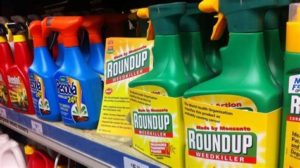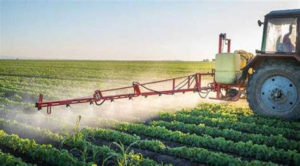Well, we have certainly covered some ground in this Glyphosate series. Now we have a brief final blog with some refreshing ideas on how to avoid or minimise glyphosate and potentially help eliminate it from the body.
 If you have not read our other blogs on glyphosate we encourage you to do so.
If you have not read our other blogs on glyphosate we encourage you to do so.
Glyphosate – what is it exactly?
8 Ways Glyphosate Derails Our Health – Part 1.
8 Ways Glyphosate Derails Our Health – Part 2.
Here are some tips to keep your body functioning well and free of chemicals like glyphosate:
- Avoid GMO foods (obviously). These especially include crops such as corn, soy, canola, sugar, beets, tobacco, alfalfa, barley, oats, sunflower oils, potatoes, peanuts, and cotton. Have a read of our related blog “Would You Like A Dose of Pesticides With Your Green Smoothie?” for the Environmental Working Group’s dirty dozen’ list or head to their website.
- Buy organic wherever you can this is possibly the most important thing you can do. Especially watch your grain intact as this tends to be where we see the highest levels of glyphosate and weed killers. Remember we are also talking about tampons and all products made from GE sugar, corn, soy, wheat, soy, canola, cotton, alfalfa, and sugar beets.
- Eat a lot of organic herbs, spices, and colorful fruits and vegetables, which are rich in polyphenols and flavonoids. This is another strategy that should help to protect us from glyphosate damage. Polyphenols in honey, turmeric and resveratrol (found in grapes, red wine, peanuts, and mulberries) have all been shown to inhibit NF-kappa-B expression, and this may be a key factor in their beneficial effects.1
- Do not confuse the “natural” label with organic standards.
- Stop using glyphosate/Roundup in your yard, and try to convince your neighbors to do the same. There are alternative methods to kill weeds, such as pulling them by hand or using a vinegar-soap-salt mixture.2
- Test your water supply for glyphosate contamination. If necessary, install a reverse osmosis filter to help remove it.
- Invest in gut health through organic produce and a good probiotic! There are lots of different probiotics available, make sure to get one with high dosages, and many different strains of bacteria. Here is one that we love.
- Regularly consuming fermented foods, such as kimchi, apple cider vinegar, sauerkraut, kombucha, and kefir. There are only a few species of microbes that can fully metabolize glyphosate, and one of them is Acetobacter. For this reason, I recommend consuming fermented foods, which typically contain Acetobacter.3
- Try extracts from plants such as dandelions, barberry, and burdock that can protect from glyphosate damage, they are most effective if administered before eating GMO foods.4
- Also, curcumin, garlic, Vitamin C, some probiotics, methyltetrahydrofolate, cobalamin, glutathione, and taurine may be beneficial in eliminating glyphosate build up.4
- Epsom salts baths may be beneficial.
- Some authors suggest that Apple cider vinegar is a great way to clear out as well!
- Eat foods containing manganese and sulfur to combat deficiencies.
- There are now several products on the market that claim to help treat glyphosate poisoning, and these are often based on probiotics, organic matter from the soil (humic acid and fulvic acid), and mineral supplements. A study done on cows exposed to glyphosate showed that a combination of sauerkraut juice, activated charcoal, humic acid, and fulvic acid was beneficial for removing glyphosate and helping to ease disease symptoms. Humic acid was also used successfully to treat glyphosate damage in chickens.6
- The company Biome medic has been researching the effects of glyphosate in humans for some time now has recently come up with a supplement that helps to rid the body of huge traces of glyphosate from our bodies. They use humic ore to revitalize the body and allow the villi in our digestive systems to regrow after the damage wreaked by glyphosate. Then, fulvic acid helps mobilize the toxins out of the body. With the body in a newer and better state, a nutritive wheat germ then regrows the microvilli. This is shown to be effective in removing about 75% of glyphosate from the body.5
- If you are a farmer or live-in a farming area, try to stop using Roundup. Farmers make up an entire 2% of cancer cases in the US alone and it has been attributed to the chemicals they are exposed to when spraying crops. In order to restore the ecosystem and have good quality soil and foods in the future, farmers need to implement regenerative agriculture strategies.
Yours in health,
Jennifer Barham-Floreani,
Bach. Chiropractic, Bach. App Clinical Science
Registered internationally, no longer practicing as a chiropractor in Australia.
Isobella Doherty,
Research Assistant & Student
Barcelona College of Chiropractic
References:
1. Cho MS, Park WS, Jung WK, et al. Caffeic acid phenethyl ester promotes anti-inflammatory effects by inhibiting MAPK and NF-κB signaling in activated HMC-1 human mast cells. Pharm Biol 2014;52(7):926-32.
Pan Y, Chen C, Shen Y, et al. Curcumin alleviates dystrophic muscle pathology in mdx mice. Mol Cells 2008;25(4):531-7.
2. Amistaadt AJ. How to use vinegar & salt as a weed killer. https://homeguides.sfgate.com/use-vinegar-salt-weed-killer-49329.html.
3. Moneke AN, Okpala GN, Anyanwu CU. Biodegradation of glyphosate herbicide in vitro using bacterial isolates from four rice fields. African Journal of Biotechnology 2010;9(26):4067-74.
4. Samsel, A.; Seneff, S. Glyphosate’s Suppression ofCytochrome P450 Enzymes and Amino Acid Biosynthesis by the Gut Microbiome:Pathways to Modern Diseases. Entropy 2013, 15, 1416-1463. https://doi.org/10.3390/e15041416
Ackermann W, Coenen M, Schrödl W, ShehataAA, Krüger M. The influence of glyphosate on the microbiota and production ofbotulinum neurotoxin during ruminal fermentation. Curr Microbiol. 2015Mar;70(3):374-82. doi: 10.1007/s00284-014-0732-3. Epub 2014 Nov 19. PMID:25407376.
5. Fulvic Acid: The Miracle in the Soil?Jabrielle Troup September 25, 2020. Available from: https://wholesomebodyhealth.com/fulvic-acid-the-miracle-in-the-soil/
6. Gerlach H, Gerlach A, Schrödl W, et al. Oral application of charcoal and humic acids influence selected gastrointestinal microbiota, enzymes, electrolytes, and substrates in the blood of dairy cows challenged with glyphosate in GMO feeds. J Environ Anal Toxicol2014;5:256.
Shehata AA, Schrödl W, Schledorn P, Krüger M. Distribution of glyphosate in chicken organs and its reduction by humic acid supplementation. The Journal of Poultry Science2014;51(3):333-7.
As we wind up this series here’s some good news that hopefully paves the way for other States and countries.
New York Bans Roundup Weedkiller on State Land
Set to take effect Dec. 31, 2021, the ban is an important recognition by the nation’s fourth most populous state that the EPA is not adequately protecting people and the environment from hazardous pesticides.
By: Beyond Pesticides
New York State is set to prohibit on Dec. 31, 2021, the use of glyphosate on all state property after Governor Andrew Cuomo signed bill S6502A/A732b late last year.
The state legislature passed the legislation in July 2020. The move is an important recognition by the nation’s fourth most populous state that the U.S. Environmental Protection Agency (EPA) is not adequately protecting people and the environment from hazardous pesticides (pesticide is an umbrella term that includes insecticides, herbicides, fungicides, etc). However, the law’s ability to improve these protections will depend significantly upon the management approach that replaces glyphosate use.
 “A transition away from Roundup and other glyphosate-based pesticides must reject the use of regrettable substitutes, and embrace sound organic principles and practices,” said Jay Feldman, executive director of Beyond Pesticides. In pest and weed management, regrettable substitutions occur when one toxic chemical is banned or restricted, and another hazardous pesticide is simply used in its place. The substitution may have a different chemical formulation, mode of action, and set of health and environmental impacts, but nonetheless fills the same role as Roundup/glyphosate when it comes to weed management.
“A transition away from Roundup and other glyphosate-based pesticides must reject the use of regrettable substitutes, and embrace sound organic principles and practices,” said Jay Feldman, executive director of Beyond Pesticides. In pest and weed management, regrettable substitutions occur when one toxic chemical is banned or restricted, and another hazardous pesticide is simply used in its place. The substitution may have a different chemical formulation, mode of action, and set of health and environmental impacts, but nonetheless fills the same role as Roundup/glyphosate when it comes to weed management.
When the answer to eliminating glyphosate is to switch to another herbicide like 2,4-D, glufosinate, triclopyr, or dicamba, the message is not getting across, and more education and advocacy is needed, advocates say. A chemical-intensive approach focuses on treating symptoms — pests and weeds, but ultimately undermines a land manager’s capacity to address these problems naturally. This is because synthetic pesticides (and fertilizers) harm soil life, while an organic approach to land management focuses on enhancing soil health by nurturing soil biology.
A natural, organic approach focuses on pest prevention, addressing the root causes of pest problems by promoting soil health. Healthier soil grows healthier plants, which will be more resilient in the face of pest and weed intrusions. In turfgrass, this includes an emphasis on cultural practices, such as mowing high, aeration, over-seeding, and use of natural soil amendments like compost. To manage weeds and pests in natural areas, ecological assessments are conducted, and importance is placed on mechanical and biological management. Biological management approaches have the potential to adequately address several problematic pests and plant species. Goats have been used throughout the country to manage opportunistic weeds on natural lands and, with their hoof action, urine, and droppings, they can help restore and stabilize soil health.
As more and more states and communities consider restrictions on glyphosate use, they are considering the next steps, and how these laws are implemented. While it is possible for the elimination of one chemical to prompt a change toward natural, organic practices, a more comprehensive approach can remove the guesswork. Beyond Pesticides strongly encourages a comprehensive policy approach that eliminates not only glyphosate but all hazardous pesticides registered by EPA with restrictions that only allow the limited use of organic compatible products as a last resort.
EPA’s failure to act on the dangers posed by glyphosate is one example in a long string of breakdowns by the agency to safeguard public health and the wider environment. Despite strong evidence of glyphosate’s carcinogenicity published by the World Health Organization, and multi-million-dollar jury verdicts for those harmed by glyphosate use, the current administration not only defends glyphosate at home but has acted on behalf of industry to flack the chemical abroad.
 Critics have pointed to the controversy surrounding glyphosate as merely the visible part of a massive iceberg of regulatory failure. Beyond Pesticides is calling on President-elect Biden and Congress to clean up the corruption of science at EPA and place a hard stop on all future pesticide registrations until the agency can ensure the science behind these registrations are sound. Readers can join Beyond Pesticides in sending a letter today.
Critics have pointed to the controversy surrounding glyphosate as merely the visible part of a massive iceberg of regulatory failure. Beyond Pesticides is calling on President-elect Biden and Congress to clean up the corruption of science at EPA and place a hard stop on all future pesticide registrations until the agency can ensure the science behind these registrations are sound. Readers can join Beyond Pesticides in sending a letter today.
If the failure to fully regulate glyphosate is symptomatic of the institutional government weaknesses in taking protective action on toxic chemicals, then organic practices and compatible inputs are the only solution. Learn more about the benefits of organic land management on Beyond Pesticides Lawns and Landscapes webpage.
Originally published by Beyond Pesticides.
Team I. Q & A with Jeffrey: How to Detox of Roundup? | Institute for Responsible Technology [Internet]. Institute for Responsible Technology. 2020 [cited 8 October 2020]. Available from: https://www.responsibletechnology.org/q-a-with-jeffrey-how-to-detox-of-roundup/


